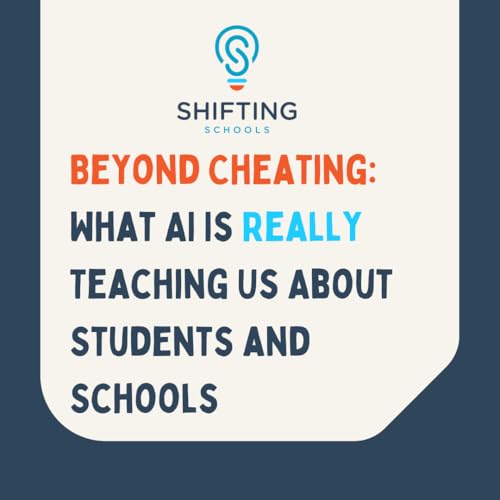The conversation about AI in education often starts—and stops—with cheating. But what if that’s the least interesting part of the story? In this episode, Tricia Friedman speaks with the team behind the new show: The Homework Machine, MIT’s Justin Reich and journalist Jesse Dukes. They unpack how generative AI is reshaping what we mean by integrity, creativity, and student voice. Together they explore how teachers can balance innovation with empathy, and what schools might learn from students already living in the AI age.
Chapters
00:00 Introduction to The Homework Machine
02:47 The Importance of Listening to Students
05:45 AI and Academic Integrity: A Deeper Look
08:23 The Role of Relationships in Education
10:59 Challenges in Teacher-Student Relationships
13:46 Navigating AI in Education
16:38 The Need for Empathy in Educational Policy
19:15 The Impact of the Pandemic on Education
22:17 Engaging Skeptics in AI Discussions
24:41 Finding Balance in Educational Priorities
27:45 Creating Safe Spaces for Student Voices
30:27 Looking Ahead: Future of The Homework Machine
The Homework Machine is a mini series from TeachLab, a podcast that investigates the art and craft of teaching. Hosted by Justin Reich, MIT Professor and director of the MIT Teaching Systems Lab.
https://www.teachlabpodcast.com/
Jesse Dukes is a journalist and comedian who has done (nearly) all the jobs in podcasting and audio including producer, editor, executive producer, reporter, mix engineer, and teacher. Along with other projects, He’s currently working with the Teaching System’s Lab at MIT on The Homework Machine, a research and podcasting project about the arrival of generative AI in schools. He has taught audio storytelling at the Center for Documentary Studies at Duke and Denison University.
Justin Reich is an associate professor of digital media in the Comparative Media Studies/Writing department at MIT and the director of the Teaching Systems Lab. He is the author of Failure to Disrupt: Why Technology Alone Can’t Transform Education, and the host of the TeachLab Podcast. He earned his doctorate from the Harvard Graduate School of Education and was the Richard L. Menschel HarvardX Research Fellow. He is a past Fellow at the Berkman-Klein Center for Internet and Society. His writings have been published in Science, Proceedings of the National Academy of Sciences, Washington Post, The Atlantic, and other scholarly journals and public venues. He started his career as a high school history teacher, and coach of wrestling and outdoor adventure activities.
We are grateful to our sponsors:
Poll Everywhere for supporting us this season, learn more:
https://www.polleverywhere.com/plans/education?utm_source=referral&utm_medium=shiftingschools&utm_campaign=shiftingschools
 47 m
47 m Oct 13 202514 m
Oct 13 202514 m Oct 6 202534 m
Oct 6 202534 m Sep 29 202523 m
Sep 29 202523 m 18 m
18 m Sep 15 202531 m
Sep 15 202531 m 40 m
40 m 25 m
25 m
